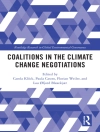Humanity stands at a critical crossroads. While our unprecedented interconnectedness and interdependence have made the world a single organism, we lack the system of global governance necessary to effectively address the urgent challenges of the 21st Century. The confluence of climate change, rapidly increasing worldwide demand for energy, and growing threats of nuclear terrorism and war make it critical for the world to develop effective new ways to collaborate in solving our collective problems. This book offers hope that we can bridge the current global governance chasm by showing a way forward. It proposes a first step that is simple yet elegant and practicable and inspired by the highly successful institutional model used to help rebuild and restore Europe in the aftermath of the Second World War. Adapting this model to address our current challenges of climate change, energy needs, and nuclear proliferation will not only solve these collective problems, but also start to create broader global governance institutions to solve the myriad other collective problems that our interconnected and interdependent world faces with ever-increasing frequency and urgency.
Daftar Isi
Preface
Introduction—Humanity at the Crossroads
1. The Vision
- How and Why the ECSC Was Created
- Jean Monnet and The Schumann Plan
2. What Can We Learn From the ECSC?
- The Qualities and Motivations of Its Founders
- Principles Woven into the Fabric of the Institution
- An Idea Whose Time Had Come
- The Pitfalls We Must Avoid
3. Understanding the Dangers We Face
- Our Excessive Reliance on Fossil Fuels to Meet Soaring Energy Demands Is Severely Harming Us
- Our Current Energy Distribution System Is Irretrievably Broken
- Wielding Oil as a Weapon and the Culture of Impunity
- Global Warming And Climate Change
4. Nuclear Energy Is Necessary In The Short Term
- Fukushima And Other Temporary Set Backs
- Continuing Strong Interest In Certain Geographic Regions
- Taking a Long-term View: Nuclear Energy Is Still a Vitally Important Option
5. Fear Of Nuclear Energy
- Harm to Our Health and Environment
- Comparing Risks
- Reactor Safety
- Proliferation for Military Uses
- Nuclear War
- Nuclear Terrorism
6. Institutions and Policies To Address Our Fears
- Abandon Nuclear Weapons and Reduce Conventional Arsenals
- Create an International Intelligence and Inspection Agency
- Have an International Standing Force to Apply the Rules
- Other Helpful Measures
- Change the System!
7. The ECSC Is A Worthy Model
8. Proposed Design for a Global Agency
- Ingredients for Success
- Nineteen Members
- Indirect Election of Members
- A Consultative Committee
- Majority Decisions, Subject to World Court Appeal
- Mandatory Global Production Levy for a Global Fund
- Control Over the Whole Nuclear Fuel Cycle
- Power to Regulate Nuclear Markets
- Power to Select Sites for Nuclear Plants
- Power to Regulate Health, Safety, and Security
- Globally Binding Rules and Enforcement
- Need for Transitional Period
9. Responding to Skeptics and Opposition
Conclusion
Afterword
Notes
Bibliography
Tentang Penulis
Sovaida Ma’ani Ewing is the founder and director of The Center for Peace and Global Governance (www.cpgg.org), a virtual think tank and online forum that pools and proposes principled solutions to pressing global problems through publications, podcasts, lectures, workshops and targeted consulting. She is an international lawyer with eighteen years of experience in private and government practice, both in England and a barrister-at-law and in the United States as a licensed attorney. For the past fifteen years she has been working as an independent scholar writing and lecturing in the areas of global governance and collective security. In addition her books and articles, she maintains a blog at collectivesecurity.blogspot.com that discusses current global issues and proposes principled solutions. Ms. Ma’ani Ewing was born to a Baha’i pioneer family in Kenya, and has lived in Africa, Europe, the Middle East, and the United States.












